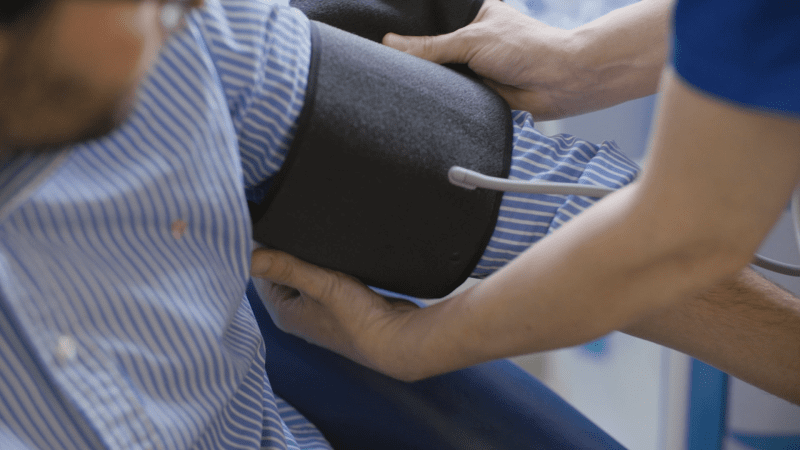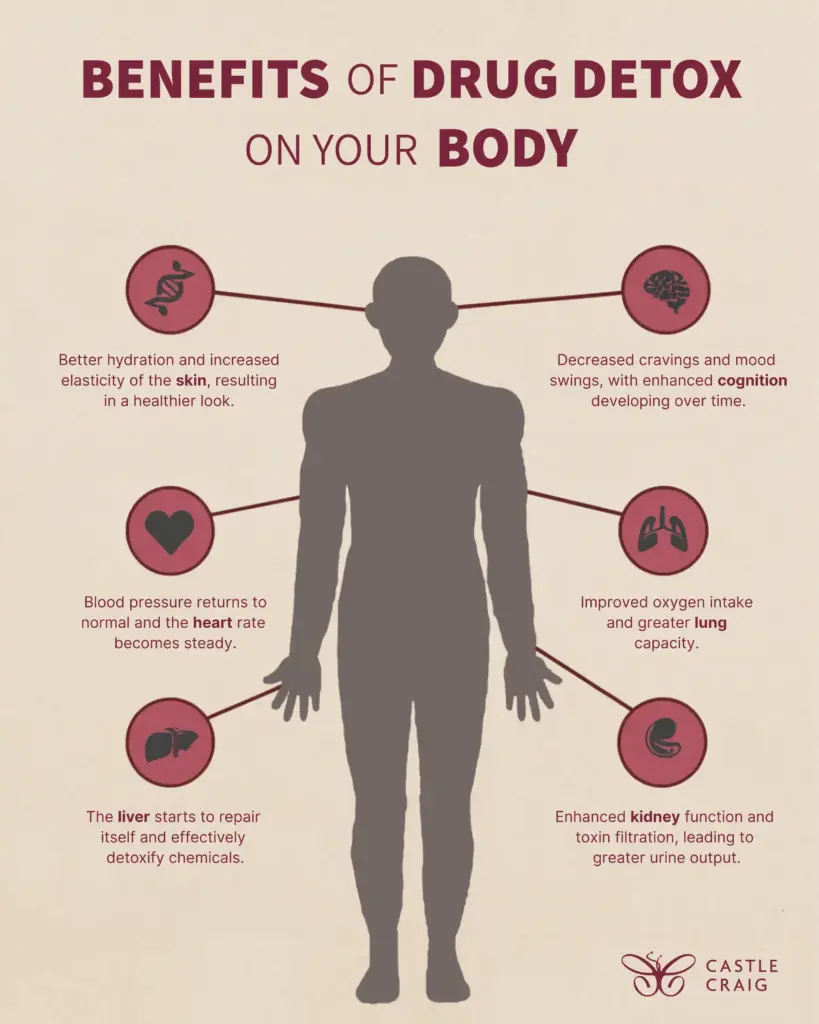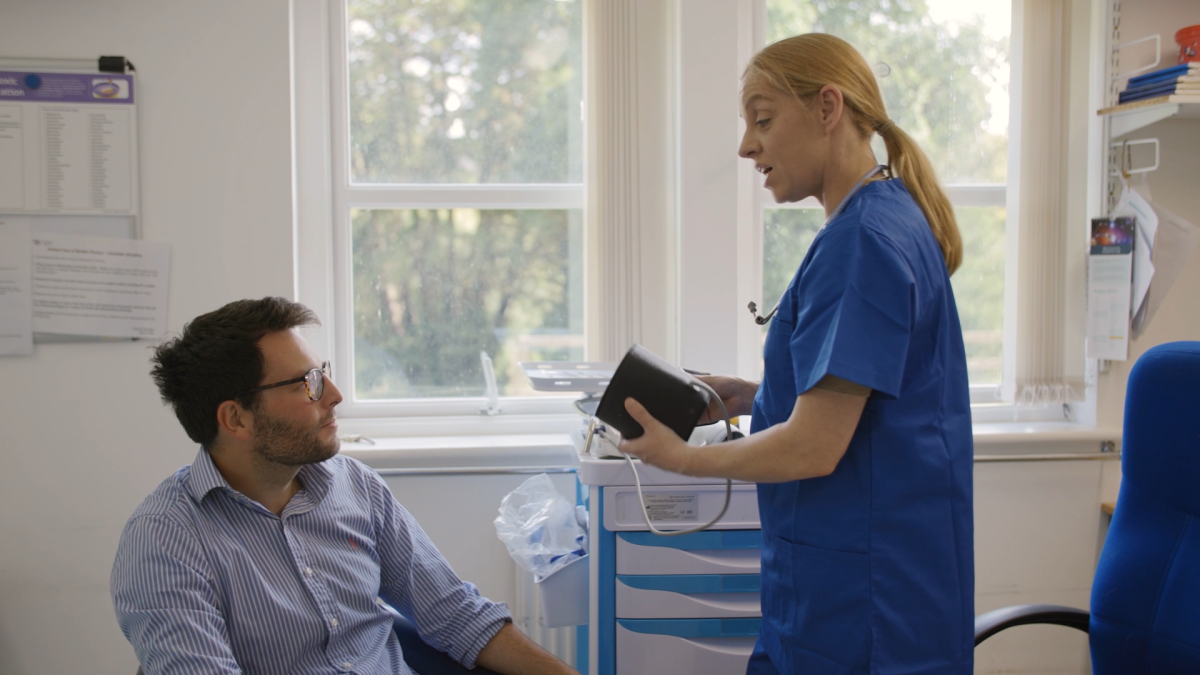
Residential Drug Detox Treatment
Drug addiction can take over a person’s life, but detox is a powerful first step to getting it back. We help people who are dependent on many different substances, including heroin, cocaine and ketamine. It is never too late to find freedom from substance misuse.
Our detox centre is located on-site at our beautiful Georgian estate, surrounded by countryside. It has 11 beds, providing a private space for drug detox. At Castle Craig, our medically managed drug detox treatment in the UK helps people withdraw from substances safely. Our expert medical team supports you round-the-clock to ease discomfort. If you are looking for residential drug addiction treatment or detox for yourself or a loved one, please talk to our team. Call us on 01721 546 263.
What is a Medically Managed Drug Detox?
A medically managed drug detox is the process of stopping drug use under the care of medical professionals. This method helps a person safely manage withdrawal symptoms that occur when the body begins to clear substances. The goal is to make a person physically stable and comfortable during this difficult time.
Withdrawal from drugs can cause serious mental and physical symptoms. Medically managed detox helps a person get through this safely. After the body is stable, a person can then move on to other therapies and addiction treatment that address the reasons behind their substance misuse.
Substances We Treat at Our Residential Drug Detox Centre
At our residential detox centre, we help people withdraw from many different types of substance addiction. We have experience in treating dependencies on opioids and other illicit drugs, as well as prescription drugs, cannabis and cocaine. Below is a list of some of the substances we provide expert medically managed detox for.
-
Medically Managed Benzodiazepine Detox
Stopping benzodiazepines is very difficult and can be dangerous. It needs medical help because it can lead to severe symptoms like seizures or psychosis. A residential detox uses a gradual dose reduction to safely guide a person through withdrawal, helping to reduce the risk of these serious complications.
At Castle Craig, we provide skilled medical care for benzodiazepine detox. Our team of doctors and nurses manages your withdrawal around the clock, helping to ease discomfort and watching for any changes. This dedicated care helps you get through the difficult process safely in our residential setting.
-
Cannabis Detox in a Residential Setting
Cannabis detox symptoms are mainly psychological and emotional, such as irritability, anxiety and mood swings. An inpatient setting helps a person manage these feelings by giving them a supportive and controlled environment. This allows a person to focus on recovery without outside distractions.
A dedicated cannabis detox helps a person get away from social groups and routines linked to cannabis misuse. A removed environment helps to reduce cravings. This gives people a chance to build new coping skills and supports a fresh start for their addiction recovery.
-
Structured Cocaine Withdrawal Treatment
Structured cocaine withdrawal treatment offers a private and controlled place to recover. It helps people move away from triggers and temptations that fuel cocaine misuse. This setting allows a person to focus on managing their intense mental and emotional symptoms, making sobriety a clearer goal.
At Castle Craig, our residential setting is designed for this purpose. We provide a medically managed detox with continuous support from our skilled team. This helps people navigate the difficult emotional lows and cravings that come with cocaine withdrawal, preparing them for lasting addiction recovery.
-
Inpatient Heroin Detox with 24/7 Support
An inpatient heroin detox with 24/7 support is a major benefit for addiction treatment. A round-the-clock medical team is always available to watch over a person during withdrawal, which can bring unpredictable physical and mental symptoms. This constant supervision helps ensure a person’s safety and comfort.
This continuous medical monitoring helps manage discomfort. It helps ease physical aches and reduces anxiety, allowing people to rest. Knowing that skilled staff are always nearby creates a feeling of security, which is very helpful for a person to get through the toughest parts of withdrawal.
-
Opioid and Prescription Painkiller Withdrawal Treatment
Stopping opioids or prescription painkillers can bring on strong physical symptoms. These include nausea, vomiting, muscle aches and a feeling like you have a bad flu. A medically managed detox is highly needed to manage these symptoms and avoid any serious complications that may arise.
At Castle Craig, our team provides expert care for opioid and prescription painkiller addiction. We tailor our prescription drug and opioid detox to ease a person’s symptoms. Our residential setting allows a person to withdraw with comfort, preparing them for the next stages of addiction treatment and long-term recovery.
-
Ketamine and Club Drug Detox in the UK
Ketamine and club drug detox in the UK offers a medically managed process to help people stop using these drugs. Withdrawal from these substances can cause unpredictable symptoms, so expert medical oversight is important. A safe and structured setting helps a person get through this initial stage of addiction treatment.
For many, the physical and emotional changes of withdrawal can be difficult. Professional support helps manage these challenges, including mood swings, anxiety or confusion. With dedicated medical guidance in ketamine detox, a person can focus on getting stable before moving on to deeper therapeutic support for their substance misuse.
-
Private Methadone and Crystal Meth Detoxification
Private methadone and crystal meth detoxification offers discreet support for complex detoxes. These addiction treatment services provide prompt access to care without waiting. This is especially helpful for methadone detox, which needs a slow taper, or for crystal meth withdrawal, which has difficult psychological symptoms.
At Castle Craig, our medically managed detox is designed for these severe dependencies. We support people through both the long tapering process of methadone and the intense mental challenges of crystal meth. Our team provides expert care in our residential setting, focusing on your safe withdrawal from substance misuse.

Start Your Recovery at a Residential Rehab Today
Free Drug Addiction Assessment
Beginning your journey to recovery is a courageous move. We offer free, confidential drug addiction assessments as a way to get started. In a private conversation with a professional, we help you understand your level of drug dependency. This talk is without pressure and helps clarify your options.
Following your assessment, we can shape a residential treatment plan that directly meets your recovery goals. We believe everyone’s journey is different, so we put your plan together for you. To talk about beginning your personal journey, please call us on 01721 546 263.
Benefits of Inpatient Residential Drug Detox Treatment
When you choose a residential drug detox in the UK, you get a clear change of scenery. Stepping away from familiar routines and triggers helps a person break old habits. A dedicated setting lets you focus entirely on your addiction recovery, removed from the distractions of daily life.
In a residential setting, round-the-clock support is always on hand. Medical staff can help manage withdrawal symptoms, easing discomfort. This constant care helps a person get through the difficult first stages of recovery and sets a solid foundation for further substance addiction treatment.

-
24 Hour Drug Detox Treatment in a Safe Setting
Receiving 24 hour drug detox treatment in a safe place is a major benefit. A medical team is always available to watch over you during withdrawal, which can bring unpredictable changes. This constant supervision helps deal with any medical issues and provides a feeling of security.
This round-the-clock monitoring helps put a person’s mind at ease, reducing worry and anxiety. It allows for rest, knowing that skilled staff are always nearby. Continuous care helps people get through the toughest moments of withdrawal and builds a stable start for drug addiction recovery.
-
Emotional and Psychological Drug Withdrawal Support
Drug withdrawal has a heavy mental and emotional side. People may face strong cravings, intense mood swings or anxiety. Having dedicated support for these feelings is important, as it helps a person navigate their inner state and get through this difficult period with a feeling of security.
At Castle Craig, our team offers support throughout drug withdrawal. We understand the mental lows and powerful cravings a person might feel. Our residential setting provides a safe space where you can focus on building mental strength, preparing you for the next steps in your recovery journey.
-
Smooth Transition into Drug Rehab Treatment
Moving from detox to drug rehab treatment is a crucial step in recovery. A smooth transfer helps a person stay focused and motivated, avoiding delays that can cause them to lose their drive. This quick move from physical stabilisation to therapy is important for building new habits.
At our residential treatment centre, the detox unit is located on the same site as our main facility. This allows a person to move smoothly from detox to addiction treatment, such as a 28-day, 60 or 90-day stay. This consistent journey helps people start their therapeutic work without delay.
-
A Private, Confidential Environment for Withdrawal
A private, confidential setting offers a safe place for withdrawal from substance misuse. Removed from public scrutiny and daily distractions, a person can focus entirely on their recovery journey. This kind of environment provides the quiet needed to begin detox and helps a person feel secure.
At Castle Craig, our residential setting in the Scottish Borders offers this private environment. We understand the importance of discretion, providing a secluded place where you can focus on drug addiction treatment. Our location helps people find the stillness needed to begin their journey to sobriety.
-
Distance From Triggers and Outside Pressures
Putting distance between yourself and your usual triggers is a powerful step in recovery. People may have drug triggers linked to certain places, social situations or even routines. Being away from these familiar cues helps you focus entirely on your residential addiction treatment.
Having no easy access to drugs or their social circles can make a major difference. A physical separation from the environment of substance misuse removes temptation. This allows a person to fully concentrate on building new habits and a different life without constant distractions.
-
Immediate Access to a Wide Range of Drug Detox Therapies
Being able to start addiction therapies right at the beginning of detox is a major advantage. It allows people to deal with both the physical side of withdrawal and the mental struggles at the same time. This early support helps a person stay motivated to continue their journey.
At Castle Craig, we provide access to a wide range of therapies as a person goes through medically managed detox. Our team helps you start your therapeutic work from day one, giving you support for both your physical and mental state. This helps you begin your recovery without delay.

Contact Castle Craig Today
Get in touch with Castle Craig to learn more about our residential detox treatment options for drug addiction. Call 01721 546 263 today to talk to a compassionate professional. Alternatively, complete our secure online form here to begin your sobriety journey. Every step brings you closer to the care and support you deserve.
Common Signs, Symptoms and Effects of Drug Withdrawal & Detoxification
When a person stops using drugs, their body reacts in different ways. While many experience common signs of withdrawal, the specific symptoms and their intensity can change greatly depending on the substance. Knowing some of the most common symptoms of drug withdrawal can help a person prepare for detox.
-
Early Signs of Drug Withdrawal
The first signs of drug withdrawal often feel like a bad flu and can appear just hours after the last dose. This early phase is a person’s body reacting to the absence of the substance. Common physical symptoms include muscle aches, sweating, nausea and a general feeling of being unwell.
For heroin and opioid addiction, patients may notice strong body pains and watery eyes very early on. For cocaine, the first signs are more mental, with a sudden drop in mood and energy. These early reactions can be different for every drug.
-
Moderate to Severe Symptoms of Drug Withdrawal
As drug withdrawal continues, symptoms often become much stronger. This intense phase can include both severe physical and mental discomfort. A person may experience painful body aches, uncontrollable shaking or even extreme anxiety that makes it hard to rest. This stage needs constant care.
For example, opioid withdrawal can bring muscle spasms and severe sickness. For stimulants, a person might have extreme depression or suicidal thoughts. At Castle Craig, our medically managed detox helps people through this. We provide round-the-clock support to manage these severe symptoms safely.
-
Psychological Effects of Drug Withdrawal
The mental effects are a major part of drug withdrawal and can last longer than physical symptoms. Some individuals may experience quick mood swings, deep sadness or a loss of interest in activities they once liked. They may also feel distant from others, feeling numb emotionally.
For certain substances, mental symptoms are very strong. Cocaine withdrawal can bring paranoia or powerful urges to use again. Stopping opioids can cause severe anxiety. It is important for a person to understand that these feelings are a normal part of detox.
-
Physical Signs and Symptoms During Drug Detox
As a person’s body clears a substance, physical reactions are a normal part of the process. Common signs include sweating, chills or a feeling like having the flu. A person may also experience muscle cramps, nausea and headaches as their body adjusts without the drug.
At Castle Craig, our private detox helps people manage physical symptoms. For example, stopping depressants can cause shaking. Opioids can lead to severe body aches. We provide medical oversight to ease discomfort and keep you safe during this physical stage of addiction treatment.
-
Long-Term Effects Without Proper Drug Detox Support
Without proper detox support, some withdrawal effects can linger for weeks or even months. Individuals may experience persistent mental health issues, such as ongoing depression or anxiety. These emotional challenges make it much harder to stay sober after leaving detox without professional help.
The lasting effects can differ by substance. Ketamine misuse may lead to long-term memory problems. For cocaine, strong cravings can return over time, which increases the risk of relapse. A lack of support can lead to further substance misuse or overdose, making continued addiction recovery harder.
Free Drug Addiction Assessment
Taking the first step and asking for help can feel daunting, but our team is here to assist you.
Can you Detox from Drugs at Home?
Detoxing from drugs at home is not recommended by medical professionals. A person’s body reacts to withdrawal in unpredictable ways. Physical and mental symptoms can quickly become severe. It is very difficult to know what to expect from one moment to the next without expert supervision.
Stopping drug or alcohol use without support can be unsafe. The emotional lows and physical effects can be very hard to manage alone, which can lead to serious health problems. Within a structured detox setting, a person’s safety is prioritised and professionals can give support to ease symptoms.
When To Seek Emergency Medical Help for Drug Detox
Even with mild physical signs, certain changes during drug withdrawal can require urgent medical help. If a person experiences any of these severe or dangerous symptoms, it is crucial to act quickly and get help.
- Seizures or convulsions
- Suicidal thoughts or extreme depression
- Psychosis, such as hallucinations or delusions
- Breathing problems or a rapid heart rate
- High fever or signs of severe dehydration
If you experience severe or unexpected complications during or after drug detox, urgent medical attention is crucial. If you feel your health is at serious risk, do not hesitate to dial 999 for an ambulance or go directly to your closest A&E department.

Drug Detox Process and Timeline (How Long Drug Detox Takes)
A common question is how long drug detox takes. The answer on detoxification timeline depends on the substance, how long it was used and the level of dependency. The detoxification process typically lasts from a few days to a number of weeks. 3 During this time, a person will experience acute withdrawal symptoms, which can be both physical and mental.
Medical detox helps a person cope with the effects of acute withdrawal, and medically managed detox is when a person goes through withdrawal in a supervised setting. Medication can be given to soothe the central nervous system and ease symptoms. If not carried out in a supervised setting, a detox can have dangerous consequences.
- Stage One: Acute Withdrawal: This first phase begins shortly after a person stops using drugs. The physical and mental effects are intense and can be very hard to manage.
- Stage Two: Peak Symptoms: Over the next few days, physical and mental drug withdrawal symptoms are at their strongest. This can be the most difficult period of detox.
- Stage Three: Subsiding Effects: After a few days, the worst physical symptoms begin to calm down. A person can then focus on managing any remaining discomfort.
- Stage Four: Post-Acute Withdrawal: In the weeks and months after detox, individuals may experience psychological symptoms that come and go, like cravings or mood swings. If acute and post-acute drug withdrawal isn’t carried out in a controlled environment, it can have dangerous health consequences or increase the chances of relapse.4
Medically Managed Drug Detox at Castle Craig
If required by the patient, the first step in our residential addiction treatment is a medically managed drug detox. We support withdrawal in a safe environment with a team of experts. Our goal is to help you get physically stable before starting the deeper therapeutic work in drug rehab.
- 24/7 Medical Care: Our doctors and nurses are on-site all the time to watch over you.
- On-Site Detox Unit: The detox centre is located on the same grounds as the main residential rehab, for a smooth transfer to therapies.
- Expert Medical Leadership: A Consultant Psychiatrist and trained doctors and nurses oversee every medical detox, ensuring expert direction for your care.
- Safe Medication Protocol: We only use medication with the utmost responsibility and when it is clinically necessary to ease withdrawal symptoms.
- Personalised Care: We shape a recovery plan that focuses on your specific needs, helping you move forward in your individual recovery.

Find Out More About Our Residential Drug Detox
We are here to help you find clarity and support. To discuss our residential drug detox with an expert, contact us today. Our team will guide you through the admissions process, answering your questions in a private conversation.
Let us help you start your journey to a new life – call us now on 01721 546 263.
Find Us
01721 546 263
info@castlecraig.co.uk
Castle Craig,
West Linton, Edinburgh, United Kingdom, EH46 7DH
-
How to Find Private Drug Detox Centres Near You
Choosing a private inpatient drug detox centre requires understanding what makes a centre right for you. People should seek a facility with expert care, a supportive medical team and dependable detox solutions. Below are useful steps to guide your search and help you decide.
- Find a Private Drug Detox Centre Near You: Start your search online with phrases such as “private inpatient drug detox centre near me” or “drug detox clinic in UK”. Adding your town or city, like “in London” or “near Manchester”, helps refine your search for better convenience. This helps you find a location that is easy for you to access.
- Look for Medically Managed Care and 24/7 Support: Detoxing from drugs can bring challenging withdrawal symptoms needing round-the-clock support. Always choose a centre with medically managed detox care and 24/7 supervision from trained professionals. This helps provide immediate assistance if symptoms intensify, putting your safety and comfort first.
- Check Reputation and Past Reviews: Reading feedback from people who have completed a detox can provide insight into the quality of care. Look for testimonials that highlight accredited, professional care, a kind team and positive outcomes. This gives you a clear picture of what to expect and helps you choose with confidence.
- Look at What the Care Plan Includes: Evaluate the treatments and supports offered, including one-to-one addiction counselling or group therapy sessions. A comprehensive setting can promote both physical and emotional recovery. Always check what is included to support a person through their drug addiction recovery journey.Inquire About Costs and Ways to Pay: Ask about overall costs of drug rehab and the admissions process. The fees for addiction treatment vary between centres. Learning the full scope of charges and whether a free assessment is available for drug detox can help you plan your journey.Verify Health Insurance Coverage: If you have private health insurance, confirm whether the detox treatment facility accepts it. Many drug and alcohol rehab clinics in the UK accept different policies. Find out which costs are covered and any potential out-of-pocket expenses for dual diagnosis care, which can influence access.
Does Health and Medical Insurance Cover Drug Detox in the UK?
Yes, health and medical insurance can help with the cost of detoxification treatment. The support you get depends on your specific policy and its benefit levels. To understand if your plan includes cover for drug detox in the UK, it is always a good idea to speak directly with your provider to see what is included for addiction treatment.
If your treatment with us is authorised, we accept private health insurance. We work with many major providers, including Bupa, AXA, Aviva and Cigna, to assist people with funding. Our team can help you understand your approved coverage and answer any questions about your stay. To discuss your insurance-covered drug detox treatment, please call us on 01721 546 263.
How Much Does Private Inpatient Drug Detox Cost?
Private drug detox in the UK costs between £650 to £1,500 per day within a comprehensive inpatient rehab programme, which can total £4,500 to £10,000 per week. Drug detox takes different lengths of time depending on the substance, health of the patient and the level of dependency.
Choosing residential detox treatment is a courageous investment in your well-being. Our admissions team gives clear guidance on our UK detox costs at Castle Craig. Your drug addiction treatment price will cover all necessary therapies, including detox and the medical support you need for lasting abstinence. Call us today on 01721 546 263 to speak to us about drug detox pricing.
Related Guides on Medically Managed Residential Detox
Detox Centre | Inpatient Detox | Alcohol | Drugs | Cocaine | Heroin | Crystal Meth | Valium | Tramadol | Benzodiazepines | Xanax | Codeine | Opioid | Ecstasy | Morphine
All of our treatment services are compliant with guidelines set by the National Institute for Health and Care Excellence (NICE) and we are regulated by Healthcare Improvement Scotland and inspected by Intertek ISO 9001.
Our Drug Detox Specialists



Begin Your Journey to Recovery at Castle Craig
Embarking on residential addiction treatment is a brave act of courage. We understand the weight of taking this step and are here to support you. Our team offers a listening ear and provides genuine understanding, helping you find the confidence to begin your journey to a life free from drug misuse.
Your recovery starts with a single step. Our team is ready to guide you through this process with kindness. To explore how our medically managed drug detox can help you or a loved one find sobriety, we encourage you to talk with us today. Call us on 01721 546 263 or fill out the form below – help is closer than you think.
Free Drug Addiction Assessment
Compassionate, expertly delivered evidence-based practices and a patient-centred approach are at the heart of our treatment model. Request a call-back from one of our professionals on any day of the week.
Frequently Asked Questions on Drug Detox
-
What Does it Mean to Detox From Drugs?
Detox, also known as withdrawal management, is the process in which all traces of drugs and alcohol are removed from the body, allowing for optimum physical health before therapeutic interventions.
-
What Are the Withdrawal Symptoms of Drug Addiction?
The withdrawal symptoms of drug addiction can vary depending on a variety of factors, including the substance taken, duration of use and the general health of the individual. However, drug withdrawal commonly includes physical and psychological symptoms.1
-
What is the Process of Drug Detoxification?
Medically supervised detox programmes, like the one at Castle Craig, typically involve an initial medical assessment to formulate a personalised treatment plan. Following this, specialist teams can offer support and care whilst managing withdrawal symptoms. Patients then transition to evidence-based treatment services after the detox process has been completed.
-
What Happens When You Stop Taking a Drug?
If you have developed dependence on a substance and the amount of this drug is reduced or stopped, you will typically experience physical and psychological withdrawal symptoms. Depending on the substance, duration of use, your physical and mental health and the method of withdrawal, these symptoms can range from mild to severe.
-
References
- World Health Organization (WHO). Clinical Guidelines for Withdrawal Management and Treatment of Drug Dependence in Closed Settings. Geneva: World Health Organization; 2009.
- Sadock BJ, Sadock VA, Ruiz P. Kaplan & Sadock’s Synopsis of Psychiatry: Behavioral Sciences/Clinical Psychiatry. 11th ed. Philadelphia: Wolters Kluwer; 2015.
- Diaper AM, Law FD, Melichar JK. Pharmacological strategies for detoxification. Br J Clin Pharmacol. 2014;77(2): 302-14.
- West R. Theory of Addiction. Oxford: Blackwell Publishing; 2006.
- Best D, Lubman DI. The recovery paradigm – a model of hope and change for alcohol and drug addiction. Aust Fam Physician. 2012;41(8): 593-7.